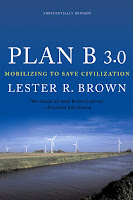Yet it's important to move beyond the doom and gloom of climate change... to focus on solutions. Let's break down this gargantuan problem into a more manageable conceptual framework. Bill once suggested that in order to bring about positive change three things need to be in place. First is an understanding of the problem... Thanks to folks like Al Gore, David Suzuki, and thousands of other intellectuals/activists we're finally cluing in on both individual and collective levels (with the exception of governments like the U.S. and Canada, to many of their citizens' embarrassment). Second is the will to bring about change... we still have a ways to go on this front, but the international community is finally stepping up to begin discussions! And third is the capability to bring about the change itself... to access and/or mobilize the needed resources (in this case collectively investing in and creating the needed solutions).
This is where Lester Brown comes in.
"Sorry, who is Lester Brown?!" you may be asking...
 Well, he's the founder of the World Watch Institute, the president of the Earth Policy Institute and a man the Washington Post called "one of the world's most influential thinkers"on world population and resources. He's also the author of Plan B, 3.0: Mobilizing to Save Civilization.
Well, he's the founder of the World Watch Institute, the president of the Earth Policy Institute and a man the Washington Post called "one of the world's most influential thinkers"on world population and resources. He's also the author of Plan B, 3.0: Mobilizing to Save Civilization.Whether you believe in climate change or not (indeed a few family members and friends still enjoy debating this with me) Brown's book is a must read!!
One of the things I appreciate most about Brown's thinking is how 'big picture' he is. He is able to coherently demonstrate the interconnectedness of the many challenges facing humanity, arguing that if we continue with 'Plan A', or ‘business as usual’, which implies not addressing climate change, food security, water scarcity, overpopulation and poverty at the scale and speed required, the cost will be human civilization itself! As much as I hope this is not so, I agree with him that we need to act NOW to change how we tread on the earth, how we co-exist as a species, and how we relate to all that crawl and canter and soar.
Brown was recently interviewed on CBC Radio’s “The Current,” about his take on the state of the world. As Anna Maria Tremonti summarized, he suggests that “we have pushed the natural systems that sustain us to the breaking point”. From Brown's perspective, the heart of our current challenges stem from our growing global population and lack of natural resource management (er, over-consumption!!). As is evident from the food protests/riots here, in Haiti, Bolivia, Cameroon, Malaysia, Pakistan etc etc we are feeling the stresses of our growing population and consumption needs already as food and oil prices climb.
However it is water, not food that Brown suggests is emerging as the principal constraint. He points out that Himalayan glacial melt is a serious concern in Asia... these glaciers are the major supplier of rivers like the Ganges and Yangtze. If they melt completely then their rivers would become seasonal. As Brown explains, "That would be the most massive threat to world food security we've ever been able to predict."
However Brown is a man of solutions. Now that we've got the basic awareness, and growing political will we simply need to invest $190 billion a year on eradicating poverty, stabilizing our global population and restoring the earth's natural systems. So providing micro finance solutions for SMEs is connected to climate change after all... On the development side the package he envisions involves universal primary education (particularly for girls), accessible basic health care and birth control in every village, and food security (supported through lunch programs at schools among other things). On the environmental side he explains the need to invest in soil conservation, reforestation, raising water productivity, and reducing our waste and consumption.
Brown recognizes that $190 billion is a lot of money, however he points out that "we're currently spending a thousand billion (or 1 trillion) dollars a year for military purposes... this is less than one fifth of that!" Here's his interconnectivity again: "What we're beginning to realise, and what some military strategists are beginning to realise is that climate change and population growth and environmental degradation, food and water shortages - these are the new threats to security. So when we look at this $190 billion budget we see it as, in effect, the new security budget." Security budget eh?! That sounds like rhetoric the U.S. administration could embrace!
Brown also talks about some of the things we can do on an individual level. Here's five that you, me and Mamma can get started on...
Beyond Doom and Gloom… 5 things we can do:
- Work to address one or more of the many pressing issues of our time (eg. poverty, food security, water resource management, environmental degradation, conflict etc)
- Encourage governments to invest in environmental research, provide humanitarian aid, and support development (that ol’ 0.7% as suggested in the Millennium Development Goals)
- Eat lower down on the food chain!! (According to Brown avoiding meats is the equivalent of downsizing from an SUV to a Prius!!)
- Reduce individual consumption (energy, water, resources)
- Talk about these issues with others!!
--
* 'Mamma' is Amira’s mother but has now suggested that she is my Nubian mama. (I wanted to do a cartwheel the day she told me I’m like a daughter to her). She is strong and patient and welcoming and kind. I’m grateful her family's presence in my life!
** Karkedeh is the Arabic name for hibiscus flower. It is delicious as a hot tea or cold juice… a little bitter like cranberry, and good for lowering blood pressure.



